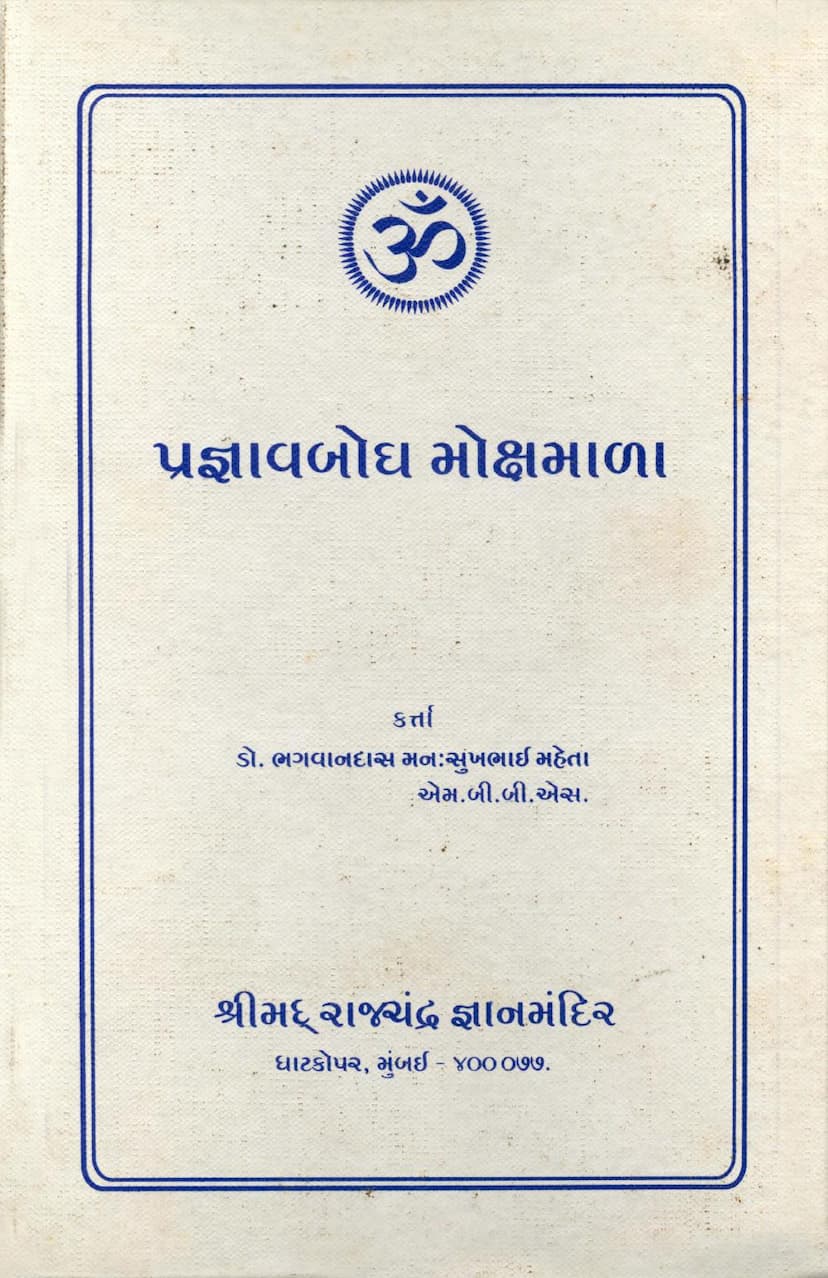Pragnav Bodh Mokshmala
Added to library: September 2, 2025

Summary
This summary aims to provide a comprehensive overview of the Jain text "Pragnav Bodh Mokshmala" by Dr. Bhagwandas Mansukh Mehta, based on the provided pages.
Book Title: Pragnav Bodh Mokshmala Author: Dr. Bhagwandas Mansukh Mehta (M.B.B.S.) Publisher: Shrimad Rajchandra Gyanmandir, Ghatkopar, Mumbai Catalog Link: https://jainqq.org/explore/007119/1
Overall Purpose:
The book "Pragnav Bodh Mokshmala" (literally, "The Garland of Liberation through the Knowledge of Wisdom") is presented as a continuation and expansion of Shrimad Rajchandra's "Balavabodh Mokshmala" (Garland of Liberation through Childlike Knowledge). Its primary aim is to guide spiritual seekers towards self-realization and liberation (moksha) by imparting profound knowledge and wisdom, fostering introspection, and encouraging adherence to the path of spirituality.
Key Themes and Content:
The book is structured into 108 "Shikshapath" (lessons or discourses), presented in a sequential and progressive manner, following the philosophical framework of Jainism. The early chapters focus on foundational concepts, while later chapters delve into deeper spiritual practices and understandings.
Core Jain Principles Covered:
- Self-Knowledge ("Atma Gyana"): The central tenet of the book is that true knowledge comes from understanding the soul. The text emphasizes that "He who knows the soul knows all."
- The Soul's True Nature: It explores the distinction between the soul (Atma) and the non-soul (Anatma) or matter, highlighting the soul's pure, conscious, and liberated nature, obscured by karmic matter.
- The Goal of Liberation (Moksha): The ultimate aim of the spiritual journey is liberation from the cycle of birth and death, achieved through the eradication of karmas.
- The Path to Liberation: The book outlines the Jain path to liberation, which is primarily through the Ratnatrayi (Three Jewels):
- Samyak Darshan (Right Faith/Perception): Correct understanding and belief in the true nature of reality, the soul, and the path.
- Samyak Gyana (Right Knowledge): Profound and accurate knowledge of the soul and its principles.
- Samyak Charitra (Right Conduct): Living in accordance with the principles of Jainism, including the five great vows (Mahavratas) and other ethical disciplines.
- Karma Theory: The text explains the intricate workings of karma, how it binds the soul, and the principles of its inflow (Ashrava), bondage (Bandha), cessation (Samvara), and shedding (Nirjara).
- Virtues and Practices: It details the importance of various virtues and practices, including:
- Ahimsa (Non-violence): Emphasized as the paramount principle, extending to all living beings in thought, word, and deed.
- Non-possession (Aparigraha): The practice of detachment from material possessions and worldly attachments.
- Truthfulness (Satya): Speaking the truth in its pure form.
- Self-Control (Brahmacharya): Mastery over desires and senses, particularly in its broader spiritual context.
- Penance/Austerity (Tapas): Practices to purify the soul and shed karmas.
- Equanimity (Samata): Maintaining a balanced state of mind amidst worldly pleasures and pains.
- Humility (Nirabhimanpana): Eradicating pride and ego.
- Compassion (Daya/Karuna): Developing empathy and concern for all living beings.
- Right Association (Satsang): Seeking the company of virtuous and knowledgeable individuals.
- Mindfulness and Concentration (Yoga/Dhyana): Practices to control the mind and focus on the soul.
- The Nature of Reality: Discussions on tattvas (principles of reality), including the soul (Jiva) and non-soul (Ajiva), their distinctions, and their interactions through karma.
- The Role of Saints and Guides: The importance of enlightened souls (Jinas, Arihants, Siddhas, Acharyas, Upadhyayas, Sadhus) as guides on the spiritual path is highlighted.
- The Injunctions of the Tirthankaras: The teachings of the Tirthankaras, particularly Lord Mahavir and Lord Rishabhdev, are presented as the ultimate authority on the path to liberation.
- The Importance of Knowledge and Action: The book stresses that mere knowledge without action is incomplete, and action without right knowledge is futile. True spiritual progress lies in the integration of both.
Structure and Style:
The book follows a structured approach, guiding the reader from basic ethical principles to advanced spiritual insights. It often employs:
- Quotations: Frequent use of quotes from Jain scriptures and teachings of revered figures like Shrimad Rajchandra and Lord Mahavir, lending authority and depth to the content.
- Illustrative Examples and Analogies: The text uses relatable analogies (e.g., the anglerfish and the fisherman, the circle of life, the analogy of medicine and the physician) to explain complex spiritual concepts.
- Poetic Verses (Kalas): Many lessons conclude with short, summary verses (Kalash Kavyas) to encapsulate the essence of the discourse and aid in memorization and contemplation.
- Sequential Learning: The lessons are designed to build upon each other, fostering a gradual understanding of Jain philosophy and practice.
Historical Context (as indicated by introductions and prefaces):
- The preface to the third edition (August 2013) notes that the first edition was published in January 2000 (VS 2056) and that the current edition is a reprint with minor changes. This indicates the text's value and continued relevance.
- The preface to the first edition mentions that Shrimad Rajchandra had a plan for four parts of Mokshmala, including the "Prajnavabodh Mokshmala" (fourth part), which he intended to compile based on an index he published. However, his passing prevented him from completing it. This current work is seen as an effort to fulfill Shrimad Rajchandra's vision, following his outlined topics.
- The author, Dr. Bhagwandas M. Mehta, draws inspiration from Shrimad Rajchandra, viewing his work as stepping into the footsteps of the great master.
Overall Message:
"Pragnav Bodh Mokshmala" is a profound and comprehensive guide for those seeking spiritual enlightenment. It emphasizes the paramount importance of self-realization, ethical living, rigorous spiritual discipline, and unwavering devotion to the path illuminated by the Tirthankaras and great souls like Shrimad Rajchandra. The book serves as a beacon, illuminating the path to the ultimate goal of liberation from worldly suffering.